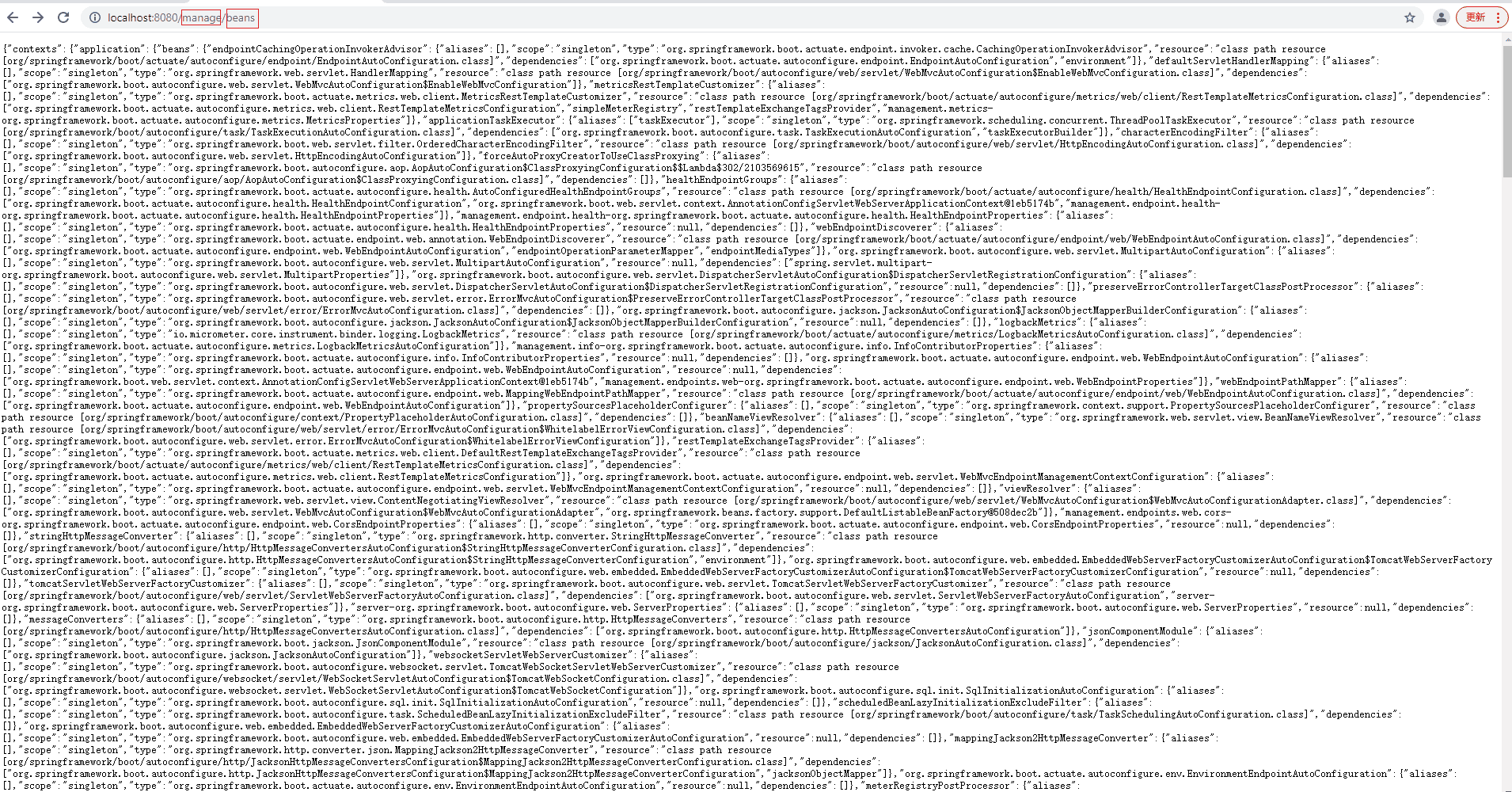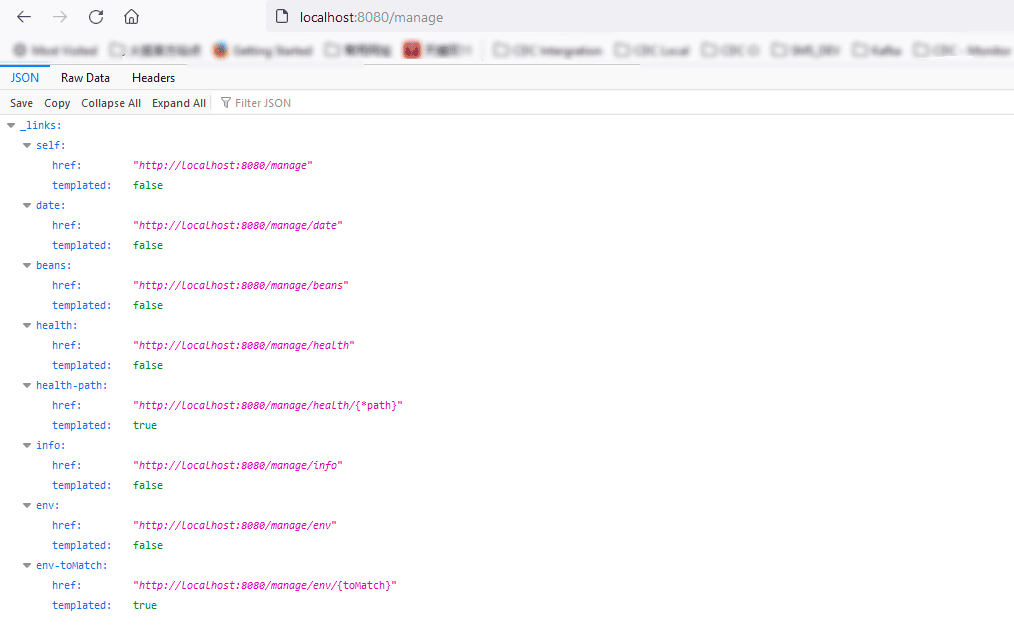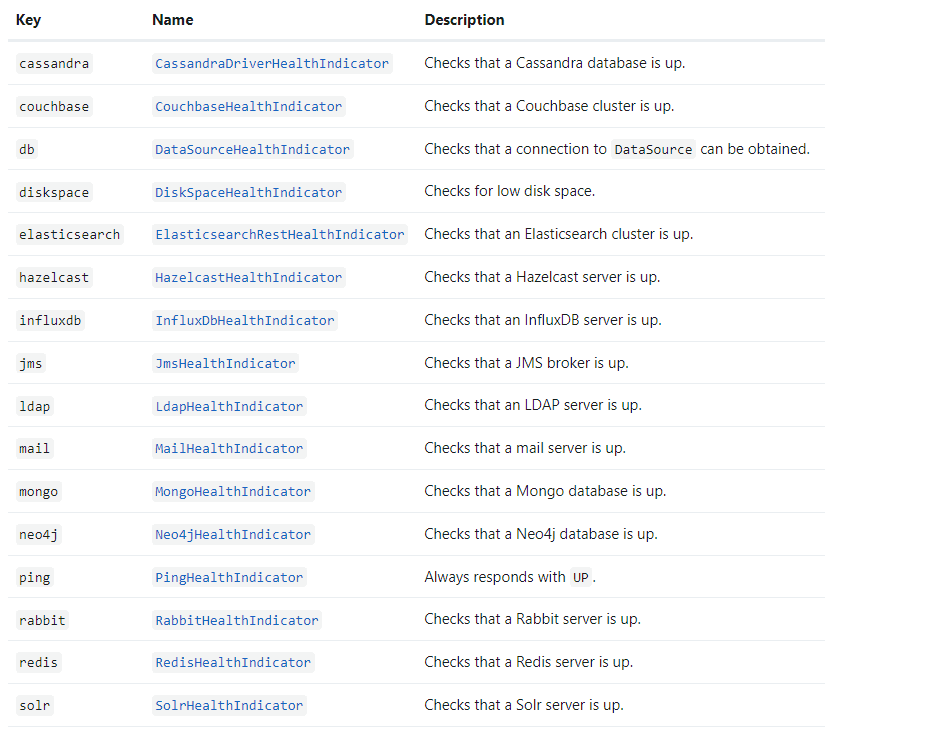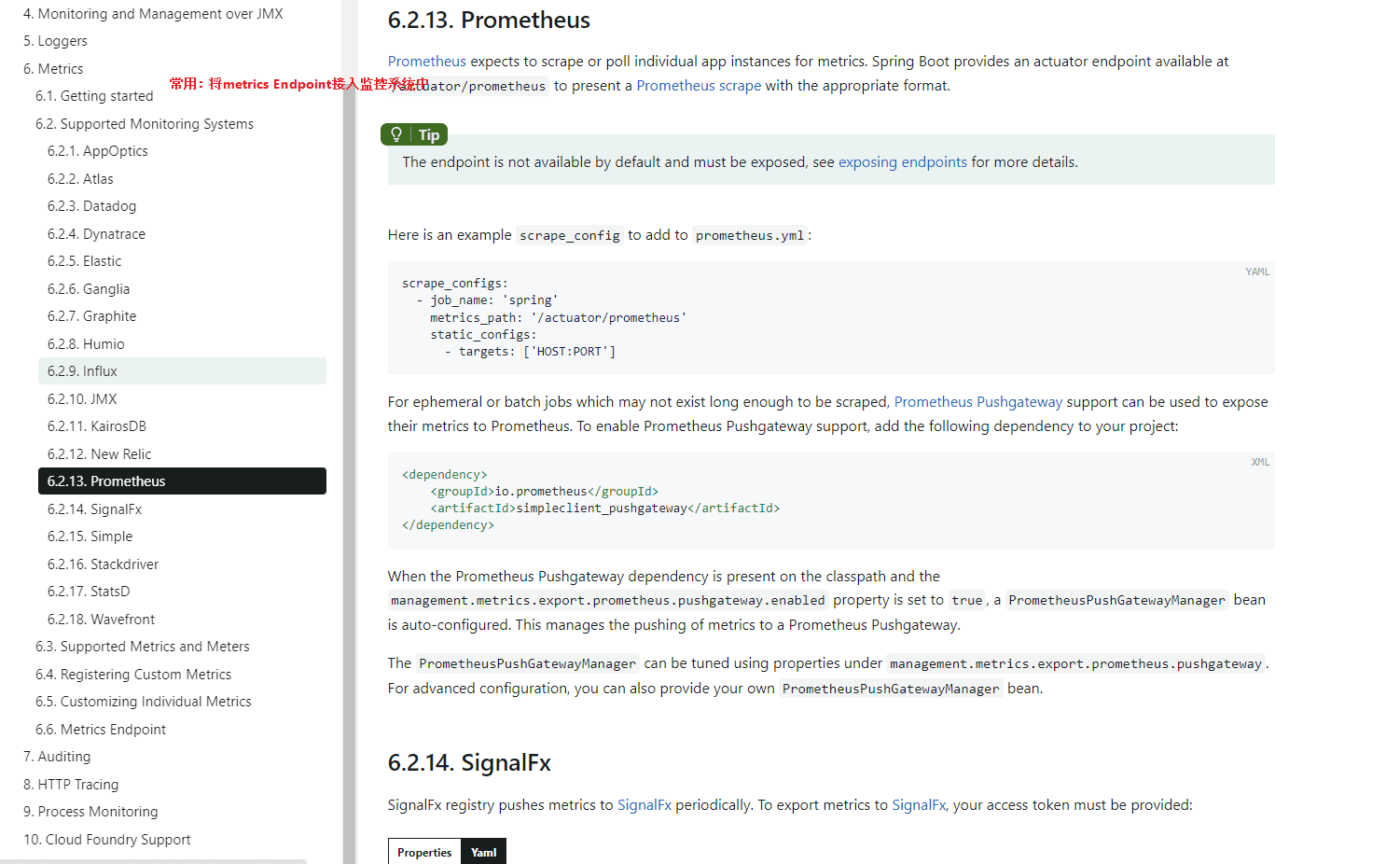▶SpringBoot监控 - 集成actuator监控工具
当SpringBoot的应用部署到生产环境中后,如何监控和管理呢?比如审计日志,监控状态,指标收集等。为了解决这个问题,SpringBoot提供了Actuator。本文主要介绍Spring Boot Actuator及实现案例。@pdai
知识准备
需要了解什么是Spring Boot Actuator, 以及其提供的功能(Endpoints)。
什么是Actuator?
致动器(actuator)是2018年公布的计算机科学技术名词。
百度百科的解释如下: 致动器能将某种形式的能量转换为机械能的驱动装置。如热致动器、磁致动器等,在磁盘中是指将电能转换为机械能并带动磁头运动的装置。
官网给的解释是:An actuator is a manufacturing term that refers to a mechanical device for moving or controlling something. Actuators can generate a large amount of motion from a small change.
从上述的解释不难知道Spring 命名这个组件为Actuator,就是为了提供监测程序的能力。
什么是Spring Boot Actuator?
什么是Spring Boot Actuator? 用在什么样的场景呢?
Spring Boot Actuator提供了对SpringBoot应用程序(可以是生产环境)监视和管理的能力, 可以选择通过使用HTTP Endpoint或使用JMX来管理和监控SpringBoot应用程序。
什么是Actuator Endpoints?
Spring Boot Actuator 允许你通过Endpoints对Spring Boot进行监控和交互。
Spring Boot 内置的Endpoint包括(两种Endpoint: WEB和JMX, web方式考虑到安全性默认只开启了/health):
| ID | JMX | Web | Endpoint功能描述 |
|---|---|---|---|
| auditevents | Yes | No | 暴露当前应用的audit events (依赖AuditEventRepository) |
| beans | Yes | No | Spring中所有Beans |
| caches | Yes | No | 暴露可用的缓存 |
| conditions | Yes | No | 展示configuration 和auto-configuration类中解析的condition,并展示是否匹配的信息. |
| configprops | Yes | No | 展示所有的@ConfigurationProperties |
| env | Yes | No | 展示环境变量,来源于ConfigurableEnvironment |
| flyway | Yes | No | flyway数据迁移信息(依赖Flyway) |
| health | Yes | Yes | 展示应用的健康信息 |
| heapdump | N/A | No | (web应用时)hprof 堆的dump文件(依赖HotSpot JVM) |
| httptrace | Yes | No | 展示HTTP trace信息, 默认展示前100个(依赖HttpTraceRepository) |
| info | Yes | No | 应用信息 |
| integrationgraph | Yes | No | 展示spring集成信息(依赖spring-integration-core) |
| jolokia | N/A | No | (web应用时)通过HTTP暴露JMX beans(依赖jolokia-core) |
| logfile | N/A | No | (web应用时)如果配置了logging.file.name 或者 logging.file.path,展示logfile内容 |
| loggers | Yes | No | 展示或者配置loggers,比如修改日志的等级 |
| liquibase | Yes | No | Liquibase 数据迁移信息(依赖Liquibase) |
| metrics | Yes | No | 指标信息 |
| mappings | Yes | No | @RequestMapping映射路径 |
| prometheus | N/A | No | (web应用时)向prometheus暴露监控信息(依赖micrometer-registry-prometheus) |
| quartz | Yes | No | 展示 quartz任务信息 |
| scheduledtasks | Yes | No | 展示Spring Scheduled 任务信息 |
| sessions | Yes | No | session信息 |
| shutdown | Yes | No | 关闭应用 |
| startup | Yes | No | 展示ApplicationStartup的startup步骤的数据(依赖通在SpringApplication配置BufferingApplicationStartup) |
| threaddump | Yes | No | 线程dump |
当然你也可以自己定义暴露哪些endpoint,
不如JMX时:
management:
endpoints:
jmx:
exposure:
include: "health,info"
web时(*代表所有):
management:
endpoints:
web:
exposure:
include: "*"
exclude: "env,beans"
简单示例
我们通过一个简单的例子,来展示自定义配置指定的endpoint,然后围绕这个简单的例子,谈谈后续拓展。
POM引入actuator包
<dependency>
<groupId>org.springframework.boot</groupId>
<artifactId>spring-boot-starter-actuator</artifactId>
</dependency>
yml配置
自定义暴露哪些endpoint, 比如如下yml配置
server:
port: 8080
management:
endpoints:
enabled-by-default: false
web:
base-path: /manage
exposure:
include: 'info,health,env,beans'
endpoint:
info:
enabled: true
health:
enabled: true
env:
enabled: true
beans:
enabled: true
上述配置只暴露info,health,env,beans四个endpoints, web通过可以/manage访问,

Endpoints的进一步拓展配置
与SpringSecurity集成保障安全
正是由于endpoint可能潜在暴露应用的安全性,web方式的endpoint才在默认情况下只暴露了一个/health。
如果你需要暴露更多,并保证endpoint接口安全,可以与Spring Security集成,比如
@Configuration(proxyBeanMethods = false)
public class MySecurityConfiguration {
@Bean
public SecurityFilterChain securityFilterChain(HttpSecurity http) throws Exception {
http.requestMatcher(EndpointRequest.toAnyEndpoint())
.authorizeRequests((requests) -> requests.anyRequest().hasRole("ENDPOINT_ADMIN"));
http.httpBasic();
return http.build();
}
}
Endpoint跨域访问
跨域访问,可以通过如下配置:
management:
endpoints:
web:
cors:
allowed-origins: "https://example.com"
allowed-methods: "GET,POST"
实现自己的Endpoint
我们可以通过@JmxEndpoint or @WebEndpoint注解来定义自己的endpoint, 然后通过@ReadOperation, @WriteOperation或者@DeleteOperation来暴露操作,
比如添加系统时间date的endpoint
package tech.pdai.springboot.actuator;
import java.time.LocalDateTime;
import org.springframework.boot.actuate.endpoint.annotation.ReadOperation;
import org.springframework.boot.actuate.endpoint.web.annotation.WebEndpoint;
import org.springframework.http.ResponseEntity;
import org.springframework.web.bind.annotation.RestController;
/**
* @author pdai
*/
@RestController("custom")
@WebEndpoint(id = "date")
public class CustomEndpointController {
@ReadOperation
public ResponseEntity<String> currentDate() {
return ResponseEntity.ok(LocalDateTime.now().toString());
}
}
enable 自定义的date
management:
endpoints:
enabled-by-default: false
web:
base-path: /manage
exposure:
include: 'info,health,env,beans,date'
endpoint:
info:
enabled: true
health:
enabled: true
env:
enabled: true
beans:
enabled: true
date:
enabled: true
你可以看到所有开放的接口中增加了date

访问效果

组件的health状况
SpringBoot默认集成了如下常见中间件的health监控

当然你也可以自定义HealthIndicator
package tech.pdai.springboot.actuator;
import org.springframework.boot.actuate.health.Health;
import org.springframework.boot.actuate.health.HealthIndicator;
import org.springframework.stereotype.Component;
/**
* @author pdai
*/
@Component
public class CustomHealthIndicator implements HealthIndicator {
@Override
public Health health() {
int errorCode = check();
if (errorCode!=0) {
return Health.down().withDetail("Error Code", errorCode).build();
}
return Health.up().build();
}
private int check() {
// perform some specific health check
return 0;
}
}
更详细的信息可以参考官网
Metrics接入监控系统
这个也是比较常用的,具体参考

Info信息如何获取
有细心的小伙伴会发现/info是空的,最简单的配置方式是在spring-boot-maven-plugin中加入build-info, 编译成jar后运行,即可获取info:
<plugins>
<plugin>
<groupId>org.springframework.boot</groupId>
<artifactId>spring-boot-maven-plugin</artifactId>
<executions>
<execution>
<goals>
<goal>build-info</goal>
</goals>
</execution>
</executions>
</plugin>
</plugins>
示例源码
https://github.com/realpdai/tech-pdai-spring-demos
参考资料
https://docs.spring.io/spring-boot/docs/current/reference/html/actuator.html#actuator.enabling